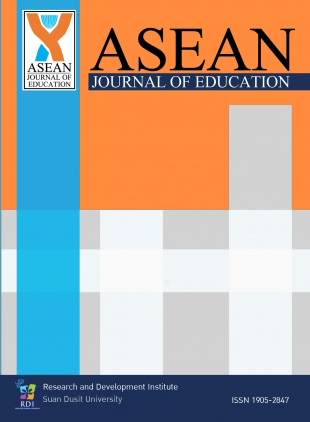Developing a Scale to Measure Implementation of a Pedagogy
Keywords:
Participation in Social Transformation, Values Formation, Active Engagement and Collaboration, Deep UnderstandingAbstract
Teachers’ pedagogy is critically important in the educational experience of students. This investigation verified the constructs embedded in the themes that emerged in the students’ responses on the implementation of a pedagogy used by private institutions in the Philippines. This pedagogy is anchored on the four components namely: constructivism (Piaget, 1970), elements of understanding by design (Wiggins and McTighe, 2011), differentiated instruction (Tomlinson, 2000) and the 4-pronged approach covering the integration of Ignacian core and related values, contemporary social realities, concepts across subject boundaries and Biblical texts reflection in relation to the concepts taught (Guillano, 2014). The study involves two phases. The first phase is qualitative in nature, involving 414 college participants. The responses on the effects of the implementation of the pedagogy are organized into the following themes: collaborative learning; self-regulation; active involvement; deeper understanding of the lesson; formation of character; and participation in social transformation. The second phase of this investigation utilizes a quantitative design where the items under the foregoing themes were administered to another set of 465 participants. Using exploratory factor analysis, the items loaded into four factors namely Participation in Social Transformation, Values Formation, Active Engagement and Collaboration, and Deep Understanding of the Concept and its Interrelatedness with Life’s Realities. To further validate the structures of the items in the scale, the researchers endorse the need for confirmatory factor analysis.
References
Barton, K. and McCully A. (2007). Teaching controversial issues… where controversial issues really matters. Teaching History, 127.
Cohen, J.B. (1985) Revolution in Science, Cambridge, M.A.: Belknap Press.
Costello, & Osborne, (2005). Practical Assessment Research & Evaluation, Vol 10, No 7, 2005, Exploratory Factor Analysis @ http://pareonline.net/pdf/v10n7.pdf
Gay, G. (2012). Our children need…“Education for resistance”. Journal of Educational Controversy, 6(1), 1-12.
Guillano, R. (2014) The RVM Pedagogy. Lourdes College Administrative Manual, 2016 edition
Jensen, E., & Nickelsen, L. (2008). Seven powerful strategies for in depth and longer lasting learning. Thousand Oaks, CA: Corwin Press.
Hadi, R. (2015). The Integration of Character Values in the Teaching of Economics: A Case of Selected High Schools in Banjarmasin. International Education Studies; Vol. 8, No. 7; 2015. Canadian Center of Science and Education
Hahn, C. L. (2010). Teaching civic engagement in five countries. In W. C. Parker (Ed.), Social studies today: Research and practice (pp. 197-202). New York: Routledge
Hinkin, T. R., Tracey, J. B., & Enz, C. A. (1997). Scale construction: Developing reliable and valid measurement instruments. Journal of Hospitality & Tourism Research, 21(1), 100-120.
Kitreerawutiwong, K., Sriruecha, C., & Laohasiriwong, W. (2015). Development of the competency scale for primary care managers in Thailand: Scale development. BMC family practice, 16(1), 174.
Mezirow, J. (1991). Transformative Dimensions of Adult Learning. San Francisco , CA: Jossey-Bass. International Journal for the Scholarship of Teaching and Learning http://digitalcommons.georgiasouthern.edu/cgi/viewcontent.cgi?article=1577&conte xt=ij-sotl
Lickona, T. (1992). Educating for Character, Mendidik Untuk Membentuk Karakter, a translation by Wamaungo J, Abdu (2012). PT. Bumi Aksara, Jakarta.
North, C. E. (2009). Teaching for social justice?: Voices from the front lines. Boulder, CO: Paradigm Publishers.
Pickett, S.T.A., Kolassa, J. and Jones, C.G. (1994) Ecological Understanding: The Nature of Theory and the Nature of Nature, Cambridge: Academic Press.
Schonrock-Adema, J., Heijne-Penninga, M., Van Hell, E.A. & Cohen-Schotanus, J. (2009). Necessary steps in factor analysis: enhancing validation studies of educational instruments. Medical Teacher, 31, e226-e232. Retrieved June, 2017 @ https://www.ncbi.nlm.nih.gov/pubmed/19089728
Tomlinson, C. A. (2000). Differentiation of Instruction in the Elementary Grades. ERIC Digest.
Tannebaum, R. P., & Cridland-Hughes, S. A. (2015). Preservice Social Studies Teachers’ Conceptions of and Experiences with Discussion as a Pedagogical Approach: A Case Study. International Journal for the Scholarship of Teaching and Learning, 9(2), 10.
Wiggins, G., & McTighe, J. (2011). The Understanding by Design guide to creating high-quality Units. Alexandria, VA: ASCD
Downloads
Published
How to Cite
Issue
Section
License
1 All articles will undergo a formal peer-review. A panel of experts from within or without the university will examine the article; approval from a minimum of two experts is required for publication. Revisions posed by the experts must be completed by the research prior to publication.
2 Once published in the ASEAN Journal of Education, the article becomes intellectual property of Suan Dusit University. Duplication, in full or part, requires permission from Suan Dusit University.
3 Excluding errors incurred during printing, author(s) are responsible for the content of their articles.






